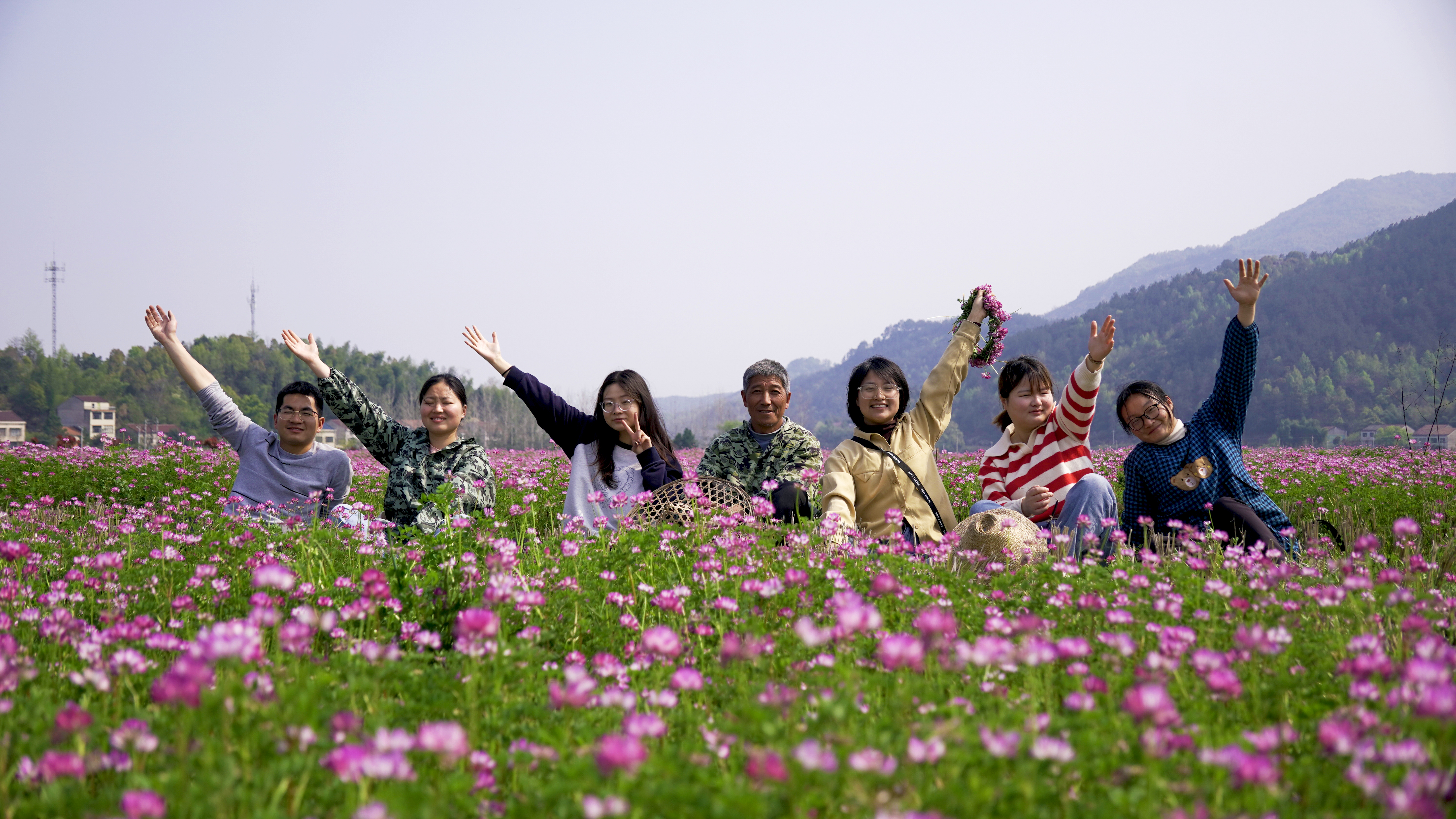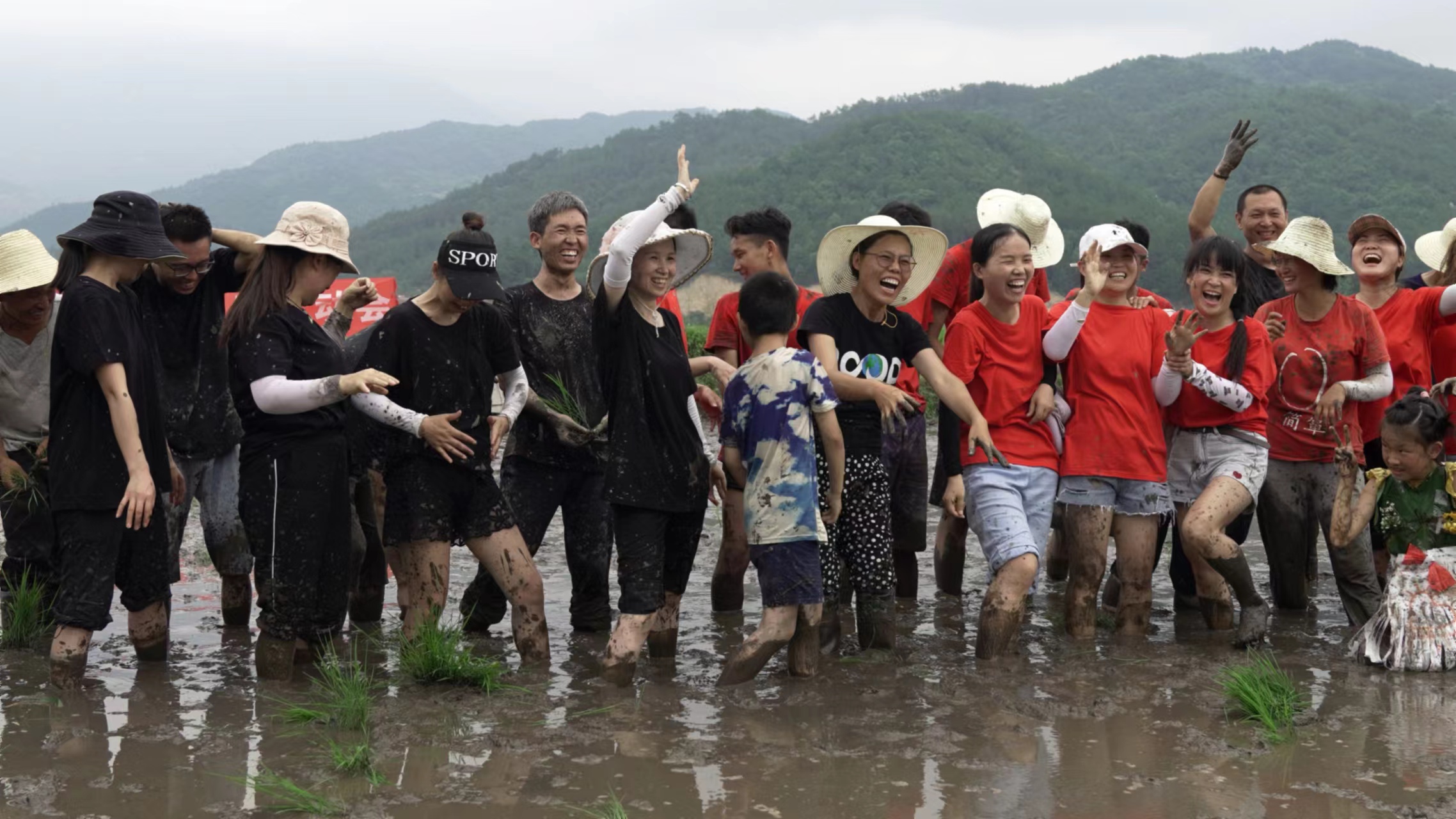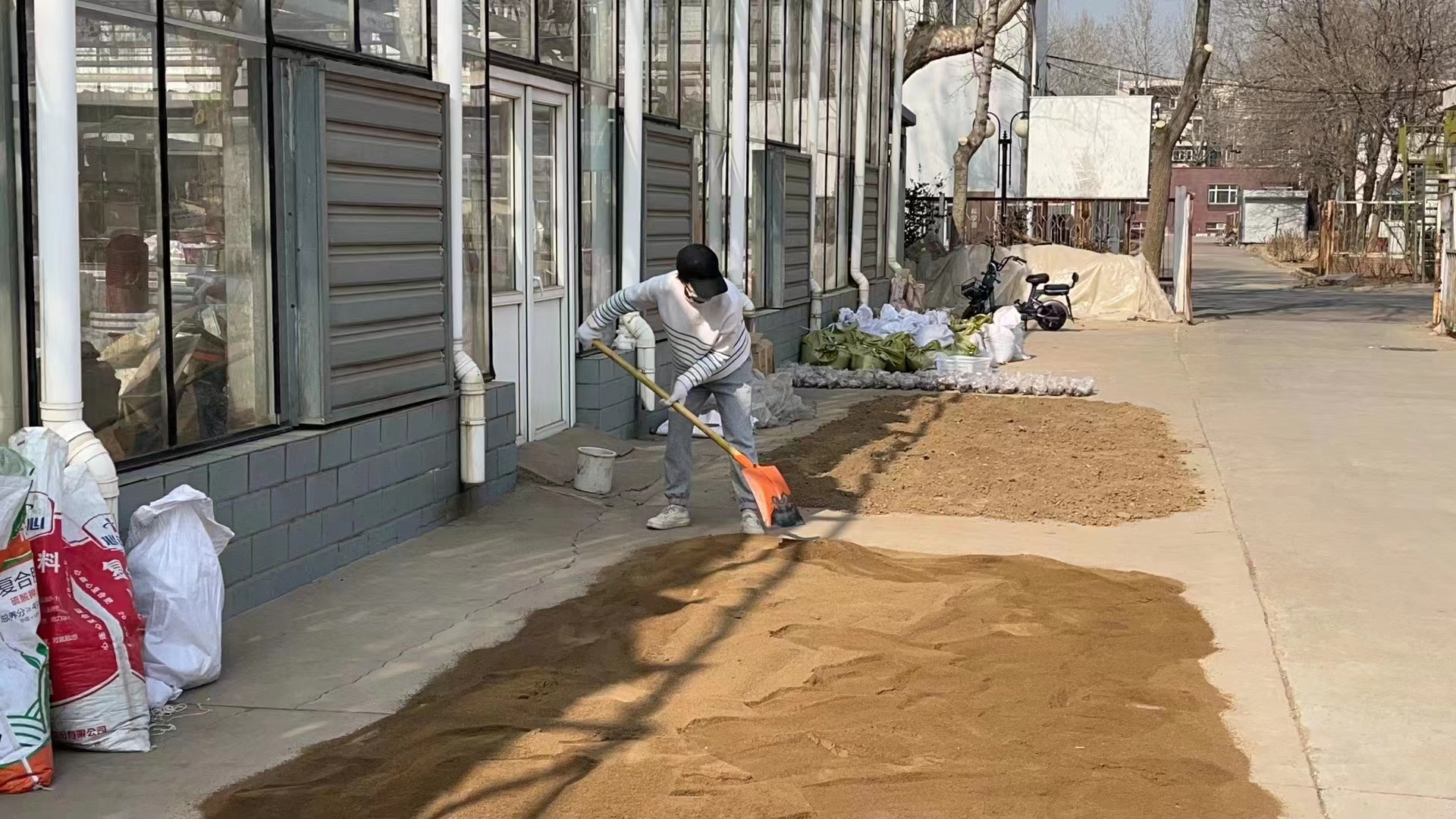
Employees of Qianyi Agriculture at Damiao production base in Huanggang City, central China's Hubei Province, April, 2023. They are in a field of Chinese milkvetch, which is commonly used in farming as a green manure. /Courtesy of Li Mingpan
Employees of Qianyi Agriculture at Damiao production base in Huanggang City, central China's Hubei Province, April, 2023. They are in a field of Chinese milkvetch, which is commonly used in farming as a green manure. /Courtesy of Li Mingpan
The world's farming population is growing older as young people increasingly seek job opportunities in the cities. Globally, the average age of farmers is about 60.
But Li Mingpan, founder of Qianyi Agriculture, sees a different picture in ecological agriculture in China. Startups in this field have younger employees, and 90 percent of his company's 150 plus staff members are in their 20s and 30s.
"These young people have faith in the future of ecological agriculture in China, but most of their parents couldn't understand their career choices," the 42-year-old told CGTN.
Growing up in a rural area, Li was familiar with the stigmas that surround farming – hard labor, low pay and low social status.
He made it into a top-ranking university when he was only 16, and became a chip engineer working in big cities such as Shanghai and Shenzhen.
In 2009, he lost 15 kilograms, from 60kg to 45kg, due to ulcerative rectitis. During the process of recovery, he learned about the relationship of food and health, and then founded an agricultural company based in Wuhan, central China's Hubei Province, which now produces and sells high-quality agricultural produce.
Currently, his company has 12 agricultural production bases in six provinces across China, occupying about 670 hectares of farmland. These farms don't use chemical fertilizers and pesticides, and increase yield by making mechanical innovations for agricultural production.
Li said the company's revenue has been increasing continuously. He believes the advancement of agriculture needs young talent who can provide new skills and vision, especially in agriculture science, brand-building and e-commerce. He observed that China's call for green development and rural revitalization are changing young people's perception of farming.
"We should let young people feel that choosing agricultural careers is something they can be proud of," said Li.

Li Mingpan (sixth from left) and his company staff pose for a group photo after a rice field sports meeting in Huanggang City, central China's Hubei Province, June, 2021. /Courtesy of Li Mingpan
Li Mingpan (sixth from left) and his company staff pose for a group photo after a rice field sports meeting in Huanggang City, central China's Hubei Province, June, 2021. /Courtesy of Li Mingpan
Young and passionate
Liao Ying, a postgraduate student in China Agricultural University, said she made the decision of studying an agriculture-related major based on both her own interest and that of China's rural development.
"To achieve rural revitalization, many issues need people like us who understand agriculture, rural areas and farmers to take the lead," Liao told CGTN.
The 25-year-old grew up in Zunyi, southwest China's Guizhou Province, and experienced farming when she was little. She admitted that doing experiments in the fields can be tedious sometimes, but added that she enjoys the down-to-earth working style.
Recently, she toiled in the university's experimental field in Quzhou County, Handan in north China's Hebei Province, which is over 400 kilometers from her university. She was delighted that she could put her theoretical knowledge into practice and solve real world problems in agricultural development.
Liao studies plant nutrition, with the aim of improving nutrients' efficiency in plant growth while realizing sustainable development of agriculture and natural ecosystems. Her research focuses on soybeans, which can obtain nitrogen on their own, using less chemical fertilizer and reducing environmental risks caused by overusing fertilizer. Liao noted that environment is now an integral factor in most research projects related to agriculture.
"We target problems caused by inappropriate fertilization and irrigation measures in agricultural production. The ultimate goal is to achieve efficient production while maintaining environmentally friendly and sustainable development," she said, adding that she will continue to pursue a PhD degree in plant physiology.

Liao Ying is drying the soil for an experiment in front of green houses at China Agricultural University, Beijing, China, February 28, 2023. /Courtesy of Liao Ying
Liao Ying is drying the soil for an experiment in front of green houses at China Agricultural University, Beijing, China, February 28, 2023. /Courtesy of Liao Ying
More support is needed
Zeng Junxia, associate research fellow of the Rural Development Institute at the Chinese Academy of Social Sciences, told CGTN that young people are drawn to ecological agriculture because they agree with its environmentally-conscious values, such as healthy soil, pesticide-free agricultural products and sustainable production model.
She said ecological farming usually includes secondary and tertiary industries such as processing and tourism, providing more new, exciting opportunities than conventional farming.
"Moreover, consumers would like to spend more on green or organic agricultural products. Compared with traditional agriculture, ecological agriculture is an industry with a larger profit margin," said Zeng.
Zeng pointed out that aging of agricultural labor force is an inevitable trend, and it is necessary to take actions to increase young people's participation to secure rural development.
"Agriculture requires long production cycles and has to face risks from both the market and natural disasters, leading to unstable income," said Zeng, adding that new technologies and business models are needed in the modernization of agriculture, in order to decrease farmers' workload and increase their income.
"More investment in infrastructure and public services should be directed to rural areas to narrow the urban-rural gap," said Zeng, noting that more support for young people in land, finance, social security and living conditions is necessary.
"If they can get access to convenient services in rural areas as they do in cities, they will be willing to start life and businesses in rural areas," she said.